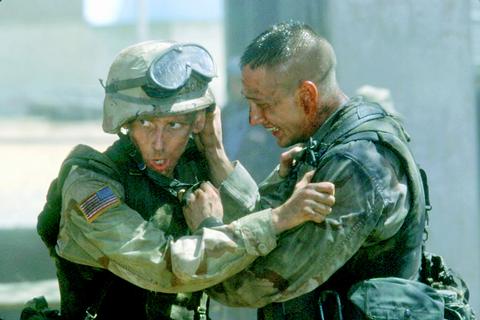Rated R, directed by Ridley Scott, with Josh Hartnett (Eversmann), Ewan McGregor (Grimes), Tom Sizemore (McKnight), Eric Bana (Hoot), William Fichtner (Sanderson), Ewen Bremner (Nelson), Sam Shepard (Garrison), running time: 143 minutes.
US troops, in Mogadishu, Somalia, as part of a 1993 UN peacekeeping detail plan to kidnap members of the inner circle of a Somali warlord. When their helicopters are brought down, the mission changes to a rescue operation. Unfortunately, much of the politics that lie at the heart of the true story are neatly overlooked in order to have the US boys (yes, Ewan McGregor sounds fresh off the farm) come across as pure as driven snow. Despite the strong cast, the dialogue seems to come straight from earlier Jerry Bruckheimer productions like The Rock. In fact, this could be Top Gun for infantrymen -- it's that slick. Even the bullet tracers seem coordinated to the film's color palette. Would that the US' involvement in Somalia had been as cleanly staged as Ridley Scott's take on it.

PHOTO COURTESY OF BUENA VISTA

May 18 to May 24 Pastor Yang Hsu’s (楊煦) congregation was shocked upon seeing the land he chose to build his orphanage. It was surrounded by mountains on three sides, and the only way to access it was to cross a river by foot. The soil was poor due to runoff, and large rocks strewn across the plot prevented much from growing. In addition, there was no running water or electricity. But it was all Yang could afford. He and his Indigenous Atayal wife Lin Feng-ying (林鳳英) had already been caring for 24 orphans in their home, and they were in

On May 2, Chinese Nationalist Party (KMT) Chairman Eric Chu (朱立倫), at a meeting in support of Taipei city councilors at party headquarters, compared President William Lai (賴清德) to Hitler. Chu claimed that unlike any other democracy worldwide in history, no other leader was rooting out opposing parties like Lai and the Democratic Progressive Party (DPP). That his statements are wildly inaccurate was not the point. It was a rallying cry, not a history lesson. This was intentional to provoke the international diplomatic community into a response, which was promptly provided. Both the German and Israeli offices issued statements on Facebook

President William Lai (賴清德) yesterday delivered an address marking the first anniversary of his presidency. In the speech, Lai affirmed Taiwan’s global role in technology, trade and security. He announced economic and national security initiatives, and emphasized democratic values and cross-party cooperation. The following is the full text of his speech: Yesterday, outside of Beida Elementary School in New Taipei City’s Sanxia District (三峽), there was a major traffic accident that, sadly, claimed several lives and resulted in multiple injuries. The Executive Yuan immediately formed a task force, and last night I personally visited the victims in hospital. Central government agencies and the

Australia’s ABC last week published a piece on the recall campaign. The article emphasized the divisions in Taiwanese society and blamed the recall for worsening them. It quotes a supporter of the Taiwan People’s Party (TPP) as saying “I’m 43 years old, born and raised here, and I’ve never seen the country this divided in my entire life.” Apparently, as an adult, she slept through the post-election violence in 2000 and 2004 by the Chinese Nationalist Party (KMT), the veiled coup threats by the military when Chen Shui-bian (陳水扁) became president, the 2006 Red Shirt protests against him ginned up by